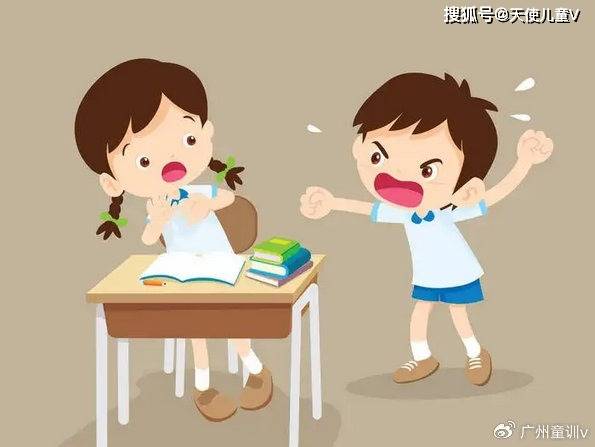If children often have unstable emotions, are irritable, disobedient, and frequently intentionally provocative towards elders, classmates, etc., parents must be vigilant! This is not rebellion, it could be that the child has oppositional defiant disorder!
I. Oppositional Defiant Disorder
1. Manifestations of Oppositional Defiant Disorder
Oppositional Defiant Disorder (ODD) is a behavioral disorder characterized by defiance, hostility, opposition, provocation, easy loss of control of emotions, irritability, non-cooperation, and disruptive behavior. Individuals with ODD harbor hostility towards peers, parents, teachers, or other authoritative figures. Oppositional Defiant Disorder is a common psychological behavioral disorder in childhood, usually onset in early childhood and peaking in adolescence. The prevalence of ODD in China is 3.6%, with a higher incidence in boys overall.
Boys with Oppositional Defiant Disorder often display more physical aggression and explosive anger, while girls tend to lie frequently, refuse cooperation, and express symptoms indirectly.
The behavioral characteristics of Oppositional Defiant Disorder are as shown in the table below:
1. Frequently throws temper tantrums;
2. Often argues with adults;
3. Frequently actively resists or refuses to comply with adult requests or rules;
4. Often intentionally annoys others;
5. Frequently blames others for their mistakes or misconduct;
6. Frequently gets easily annoyed by others;
7. Often angry and resentful;
8. Often holds grudges or is unforgiving.
If a child’s symptoms match four or more of the items above and persist for at least 6 months or longer, parents may consider taking the child to a specialized hospital for a check-up to see if the child has Oppositional Defiant Disorder.
2. Relationship between Oppositional Defiant Disorder and ADHD
Oppositional Defiant Disorder is more common in children with ADHD, with clinical findings indicating that about 65% of children with ADHD also have Oppositional Defiant Disorder. When children with ADHD also have Oppositional Defiant Disorder, they not only have problems with impulse control, but also exhibit anger, irritability, and even physical aggression.
These children, due to their inability to control their emotions, throw temper tantrums and may harbor resentment, intentionally making others upset and blaming others for their mistakes. Apart from unintentionally harming classmates due to excessive excitement, they might also deliberately criticize and accuse classmates, refusing to apologize.
II. How Should Parents Deal with Oppositional Behavior?
Most children with Oppositional Defiant Disorder have fragile hearts and use aggression, anger, and hostility to protect and conceal their inner vulnerabilities. Dr. Li has 3 suggestions on how to help children reduce oppositional defiant behavior:
1. Maintain calmness and create a positive family atmosphere:
When a child displays oppositional behavior, parents resorting to scolding, threats, or even violence to control the child can backfire, offering no help for the child’s subsequent improvement. If the child’s negative behavior is not dangerous, serious, or offensive to others, parents should avoid giving attention to it as much as possible.
At the same time, parents should try to avoid intense emotions and coarse language, not rush to control or correct the child’s behavior, giving each other some time and space to ease the situation, and only proceed with communication after both parties have stabilized emotionally.
2. Maintain a proper communication attitude:
When a child intentionally provokes you, parents can promptly intervene, but maintain a stern and calm attitude, handle the situation quickly, move on after it’s over, and avoid dragging out the situation incessantly.
When children feel that parents are not there to lecture but to respect and help them, they are more willing to share their innermost thoughts. Parents need to communicate more with children, helping them understand emotions and recognize them, teaching children how to release their emotions reasonably and express their needs and thoughts.
3. Reinforce the child’s positive behavior:
Deep down, every child wants to be a good child, loved and cared for by parents. When children exhibit behavioral issues, parents tend to notice only the child’s shortcomings and faults. This often leads to a psychological gap for many children, making them intentionally oppose parents: “If you point out my flaws, then I’ll stick to them, what can you do about it?”
This requires a change in educational strategies, offering positive reinforcement to children, such as positive attention, using tokens and specific rewards to enhance good behavior. Employing some language strategies, communicating empathetically with children helps to better understand their inner world. When children feel cared for and accepted by parents, they are more likely to open up, paving the way for smooth communication, and children are more likely to take parents’ advice to heart.
Note: This article is for educational purposes; certain content and images are sourced from the internet. For copyright concerns, please contact for removal.
Angel Children’s Hospital, Guangzhou
Healthy children equal happy families!


